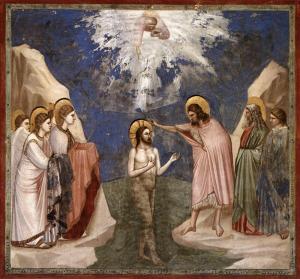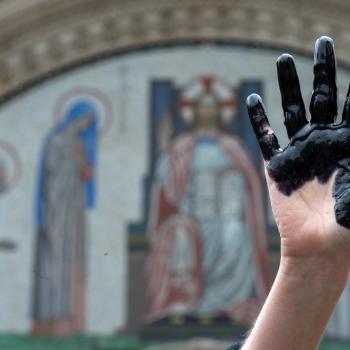 The contamination and pollution of nature, caused by human sin, can be seen defacing the world over. Consumeristic greed enjoys the bounties of the world, the fruits of nature, while ignoring the needs of nature itself. Waters are polluted. The food which we eat is contaminated. The air we breathe is filled with various toxic fumes. The rain which comes down to water the ground is acidic, destroying what it touches. Climate changes, with excessive heat melting the polar ice caps threatens to change the face of the world. Various species of life are being extinguished from the face of the earth each and every day. If we but cared, all of this and more could be met with human ingenuity, but instead, we like to live in luxury today and put off til tomorrow what should be done today.
The contamination and pollution of nature, caused by human sin, can be seen defacing the world over. Consumeristic greed enjoys the bounties of the world, the fruits of nature, while ignoring the needs of nature itself. Waters are polluted. The food which we eat is contaminated. The air we breathe is filled with various toxic fumes. The rain which comes down to water the ground is acidic, destroying what it touches. Climate changes, with excessive heat melting the polar ice caps threatens to change the face of the world. Various species of life are being extinguished from the face of the earth each and every day. If we but cared, all of this and more could be met with human ingenuity, but instead, we like to live in luxury today and put off til tomorrow what should be done today.
We hide ourselves in the smog of our own making. We hide our eyes from the light of truth so we can feign ignorance. The world is not getting better: we are turning the world into a garbage heap, and the waters of the world not only show the traces of our adulteration, in and through the chemicals which can be found in them, but they have become another dumping spot for our consumer waste, where various plastics and metals are found interacting and destroying the wildlife within.
We have corrupted the earth. The time of judgment will come upon us, upon those of us who destroy the earth (cf. Rev. 11:18). We have neglected our duty. We have been granted stewardship over the world, but instead of being workers in the field, we have been slothful hedonists. Nature has been damaged by us, and it comes back at us with a demonic-like rage. We will suffocate in the world which we have made.
We have been there before. Humanity has mishandled its obligation for millennia. The story of salvation found in Scripture is also the story of humanity and its destruction of the earth. The world has been changed and damaged by our sin: original sin is said to have brought death to the world, not because historically there was no death before advent of humanity, but because humanity brought a new mode of death to the world, a spiritual death. The interdependent relationship between humanity and the rest of the world means what humanity does will have consequences upon the environment, and so the spiritual death in humanity means humanity will spread the corruption of death into the world itself, slowly polluting it, turning it into a waste land of death.
Jesus came so that we might have life, but also, so that the world itself and all that is in it can be renewed. The world, turned as it were into a graveyard representing the history of human sin, became a dark and miserable place, a place fit for the demonic powers to grow and overwhelm humanity by the power granted to them. Those powers fed off of the death which humanity brought to the world: not just in human or animal sacrifices to idols, but also the sewage and filth which humanity left behind in its “advances” in history. The world was moaning in pain, awaiting the time for the children of God to reveal themselves, for those who have been regenerated and brought back to spiritual life in grace so that they can return and share that life-giving grace to the world (cf. Rom 8:19). The world was moaning for the time of the Son of God, for the God-man to come and bring his saving light upon all things. The world was waiting for spiritual purification of itself, but also of humanity so that humanity would begin to have a proper relationship with it.
Then Jesus came from Galilee to the Jordan to John, to be baptized by him. John would have prevented him, saying, “I need to be baptized by you, and do you come to me?” But Jesus answered him, “Let it be so now; for thus it is fitting for us to fulfil all righteousness.” Then he consented. And when Jesus was baptized, he went up immediately from the water, and behold, the heavens were opened and he saw the Spirit of God descending like a dove, and alighting on him; and lo, a voice from heaven, saying, “This is my beloved Son, with whom I am well pleased” (Matt. 3:13-17 RSV).
The Theophany, the revelation of God at the baptism of Jesus, was the beginning of the change. Jesus entered the waters, not to be purified by them in the rite of baptism, but to purify them, to cleanse them and make them holy. God revealed himself to John while he entered into the waters and began the process of spiritual purification, overtaking and overturning the spiritual darkness and corruption established in them by human sin. The demonic powers felt in the waters, felt in and all around the world, due to human corruption and spiritual pollution, were overturned by the light of Christ: in the baptism of Jesus, in the Theophany, the light of the world shown forth as Jesus began the process of renewal upon the face of the earth. It was not to be some gnostic spiritual renewal which ignored material existence: it was to be a holistic renewal, where the human spirit and the world at large can be enlightened and cleansed by the grace of God.
Jesus allowed himself to be humbly lowered into the waters: John did not think he was worthy of doing this service for God, and yet Jesus told him it was his obligation and duty. John shared in the work of Christ, he shared in the work of the enlightenment of the world. Jesus works with humanity and expects humanity to work with him. His baptism was the foundation of his cleansing work brought into the world. We are expected to be like John: Jesus comes to us, asks us to work with him, to bring him into contact with the world, and to enlighten the world through our work with him, to purify it, cleansing it from the contamination and filth which human sin has brought to it. The light of truth is to shine throughout the world, to beatify it. Human sin makes it ugly. Christians have a duty to the world, to make sure they do not let the world be destroyed by pollution: we might not be worthy, for we know we need to be transformed by Christ, but Christ comes to us and tells us that he wants us to work with him, to cooperate with him, to share in his ministry. We must not turn our backs. We must not selfishly put off today the beatification of the world:
For the grace of God has appeared for the salvation of all men, training us to renounce irreligion and worldly passions, and to live sober, upright, and godly lives in this world, awaiting our blessed hope, the appearing of the glory of our great God and Savior Jesus Christ, who gave himself for us to redeem us from all iniquity and to purify for himself a people of his own who are zealous for good deeds (Tit. 2:11-14 RSV).
If we want to be baptized into Christ, to be baptized with Christ, we must then continue the work of his baptism into the world. We must renounce the darkness of sin. We must shine the light of truth and grace across the world. We must once again become stewards of the earth, taking care that the pollution of sin is overcome and the world itself can once again share in the glory of God. This is one of the many lessons which we can learn from the Theophany. If we have been enlightened by it, the time is now to let that light shine forth and overcome the demonic corruption of sin, to overturn the contamination that we have brought to the world, and to work with Jesus in its purification.
[IMG=Baptism of Christ by Giotto di Bondone [Public domain] via WikimediaCommons]
Stay in touch! Like A Little Bit of Nothing on Facebook













